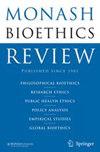“护理、护理机器人和传染病”综述。
IF 1.6
Q2 ETHICS
引用次数: 1
摘要
智能机器或护理机器人能在多大程度上完成病人护理人员的亲密工作?机械化将如何改变我们对人类照料任务的基本特征和照料者角色的理解?这篇文章在回顾哲学家和生物伦理学家Michael Brannagan的《看护、看护机器人和传染病》时,讨论的正是这些具有现实世界含义的复杂问题。本文章由计算机程序翻译,如有差异,请以英文原文为准。
A review of "Caregiving, Carebots, and Contagion".
How far can smart machines, or carebots, go in performing the profoundly intimate human work of patient caregivers? How will mechanization alter how we understand the essential features of the human task of caregiving and the role of the caregiver? It is these complex questions, with real world implications, that this article discusses in reviewing "Caregiving, Carebots, and Contagion" by philosopher and bioethicist Michael Brannagan.
求助全文
通过发布文献求助,成功后即可免费获取论文全文。
去求助
来源期刊

Monash Bioethics Review
ETHICS-
CiteScore
2.70
自引率
6.20%
发文量
16
期刊介绍:
Monash Bioethics Review provides comprehensive coverage of traditional topics and emerging issues in bioethics. The Journal is especially concerned with empirically-informed philosophical bioethical analysis with policy relevance. Monash Bioethics Review also regularly publishes empirical studies providing explicit ethical analysis and/or with significant ethical or policy implications. Produced by the Monash University Centre for Human Bioethics since 1981 (originally as Bioethics News), Monash Bioethics Review is the oldest peer reviewed bioethics journal based in Australia–and one of the oldest bioethics journals in the world.
An international forum for empirically-informed philosophical bioethical analysis with policy relevance.
Includes empirical studies providing explicit ethical analysis and/or with significant ethical or policy implications.
One of the oldest bioethics journals, produced by a world-leading bioethics centre.
Publishes papers up to 13,000 words in length.
Unique New Feature: All Articles Open for Commentary
 求助内容:
求助内容: 应助结果提醒方式:
应助结果提醒方式:


